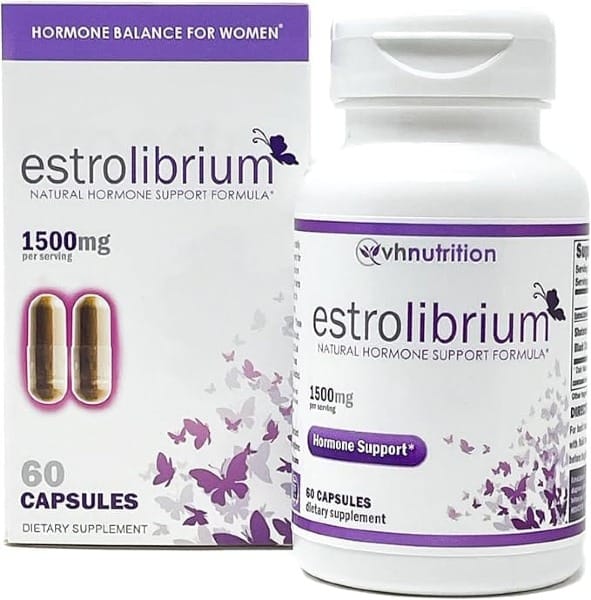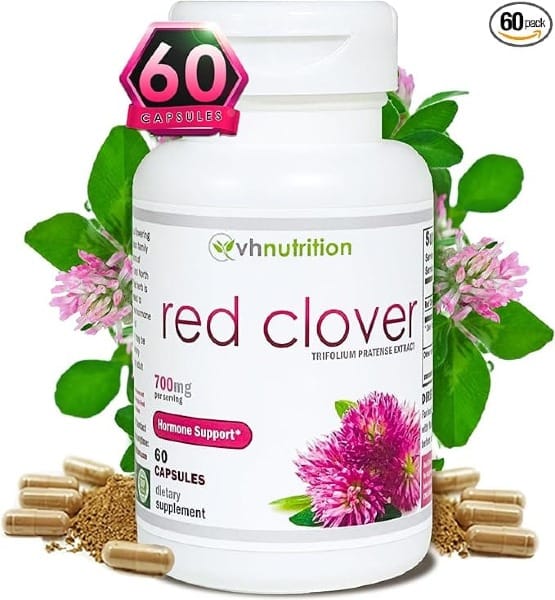Menopause is a natural phase in a woman's life that brings about significant hormonal changes. These changes can lead to various uncomfortable symptoms, including itching and pain. In this article, we'll explore the best hormone balance supplements for women experiencing menopause-related discomfort and discuss how they can help alleviate these symptoms.
What causes hormonal imbalance during menopause?
Hormonal imbalance during menopause is primarily caused by the natural decline in estrogen production as the ovaries gradually cease their function. This shift in hormone levels can lead to a range of symptoms that affect a woman's overall health and well-being.
Understanding hormone levels in women
Women's bodies rely on a delicate balance of hormones to maintain various bodily functions. The key hormones involved in this balance include estrogen, progesterone, and testosterone. During menopause, the levels of these hormones fluctuate, with estrogen experiencing the most significant decline.
Common symptoms of hormonal imbalance
Hormonal imbalance can manifest in various ways, including:
- Hot flashes and night sweats
- Mood swings and irritability
- Vaginal dryness
- Itchy skin
- Joint pain
- Sleep disturbances
- Weight gain
These symptoms can significantly impact a woman's quality of life during the menopausal transition.
The role of estrogen in hormonal balance
Estrogen plays a crucial role in maintaining hormonal balance in women. It affects various bodily functions, including:
- Regulating the menstrual cycle
- Supporting bone health
- Maintaining skin elasticity
- Influencing mood and cognitive function
As estrogen levels decline during menopause, it can lead to an imbalance in other hormones, contributing to the various symptoms experienced during this time.

vhnutrition ESTROLIBRIUM natural hormone support formula
Hormone Balance for Women | Menopause Support Supplement | Black Cohosh, Shatavari, Chaste Tree Berry (Vitex), Dong Quai | 60 Capsules in Easy to Swallow Pills. Made in the USA
How can supplements help balance hormones?
Supplements can play a significant role in supporting hormonal balance during menopause. They can help address nutritional deficiencies and provide the body with essential compounds that support hormone production and regulation.
Essential vitamins for hormonal health
Several vitamins are crucial for maintaining hormonal health:
- Vitamin D: Supports bone health and may help reduce the risk of osteoporosis, a common concern during menopause.
- Vitamin E: Acts as an antioxidant and may help alleviate hot flashes.
- Vitamin K: Works in conjunction with vitamin D to support bone health.
Best supplements for menopause symptoms
Some of the best supplements for managing menopause symptoms include:
- Black Cohosh: May help reduce hot flashes and night sweats.
- Red Clover: Contains isoflavones that can mimic estrogen in the body, potentially alleviating some menopause symptoms.
- Maca Root: May help balance hormone levels and improve mood.
Using omega-3 fatty acids for hormonal support
Omega-3 fatty acids, found in fish oil supplements, can provide several benefits for menopausal women:
- Reducing inflammation
- Supporting heart health
- Potentially improving mood and cognitive function
Including omega-3 supplements in your diet may help alleviate some menopause-related symptoms and support overall health.

vhnutrition RED CLOVER
VH Nutrition's Red Clover contains naturally occuring phytonutrients which may provide hormonal support*. Each serving contains 700mg of Trifolium Pratense Extract powder
What are the best vitamins and supplements for women?
While individual needs may vary, certain vitamins and supplements are particularly beneficial for women experiencing menopause-related hormonal imbalances.
B vitamins and their impact on hormonal balance
B vitamins play a crucial role in hormonal balance and overall well-being:
- B6: Helps regulate mood and may reduce depression symptoms.
- B12: Supports energy production and cognitive function.
- Folate: Essential for cellular health and may help reduce the risk of certain cancers.
Probiotic supplements for women's health
Probiotics can support women's health during menopause by:
- Promoting digestive health
- Supporting the immune system
- Potentially reducing the risk of vaginal infections
Including a high-quality probiotic supplement in your routine may help maintain overall health during the menopausal transition.
Natural dietary supplements to help balance hormones
Several natural supplements can help support hormonal balance:
- Chasteberry: May help regulate progesterone levels.
- Evening Primrose Oil: Can potentially reduce hot flashes and improve skin health.
- Dong Quai: Often used in traditional Chinese medicine to support women's health and hormonal balance.
How do lifestyle changes affect hormonal balance?
While supplements can be beneficial, lifestyle changes play a crucial role in managing hormonal imbalances during menopause.
Dietary adjustments for menopause symptoms
A balanced diet can significantly impact hormonal health. Consider incorporating:
- Phytoestrogen-rich foods like soy, flaxseeds, and legumes
- Calcium and vitamin D-rich foods for bone health
- Whole grains and lean proteins for energy and mood stability
Limiting caffeine, alcohol, and processed foods can also help reduce menopause symptoms.
The importance of regular exercise in hormonal health
Regular physical activity can help:
- Maintain a healthy weight
- Reduce stress
- Improve mood and sleep quality
- Support bone and heart health
Aim for a combination of aerobic exercise and strength training for optimal benefits.
Managing stress hormones and their effects
Chronic stress can exacerbate hormonal imbalances. Implement stress-reduction techniques such as:
- Meditation or mindfulness practices
- Yoga
- Deep breathing exercises
- Regular relaxation time
These practices can help manage stress hormones and improve overall well-being during menopause.

What should women look for in hormone support supplements?
When choosing hormone support supplements, it's essential to consider several factors to ensure safety and effectiveness.
Key ingredients to support healthy hormones
Look for supplements that contain:
- Phytoestrogens (plant-based compounds that mimic estrogen)
- Adaptogenic herbs like ashwagandha or rhodiola
- Essential vitamins and minerals for hormonal health
These ingredients can help support overall hormonal balance and alleviate menopause symptoms.
Evaluating the best supplements on the market
When selecting supplements, consider:
- Third-party testing for quality and purity
- Reputable brands with good customer reviews
- Supplements that address your specific symptoms
Always consult with a healthcare provider before starting any new supplement regimen.
Understanding the role of hormone replacement therapy
While not a supplement, hormone replacement therapy (HRT) is an option for some women experiencing severe menopause symptoms. HRT involves taking medications containing female hormones to replace those the body no longer produces. It's important to discuss the potential benefits and risks of HRT with a healthcare provider.
How to address menopause itch and pain effectively?
Menopause-related itching and pain can be particularly bothersome. Understanding their causes and implementing targeted strategies can provide relief.
Identifying the causes of itchy skin during menopause
Itchy skin during menopause is often caused by:
- Decreased estrogen levels leading to reduced collagen production
- Dehydration of the skin
- Changes in skin pH
Addressing these underlying causes can help alleviate itching.
Top natural remedies for menopause-related pain
Natural remedies for menopause-related pain include:
- Topical magnesium for muscle and joint pain
- Turmeric supplements for their anti-inflammatory properties
- Essential oils like lavender or peppermint for pain relief
These natural approaches can complement other treatments for menopause symptoms.
Combining supplements with lifestyle changes for relief
For optimal relief from menopause itch and pain:
- Use supplements targeted at hormonal balance and skin health
- Stay hydrated and moisturize skin regularly
- Practice stress-reduction techniques
- Maintain a balanced diet rich in anti-inflammatory foods
By combining these approaches, women can effectively manage menopause-related discomfort and support their overall health and well-being.
In conclusion, managing hormonal imbalances during menopause requires a multifaceted approach. By incorporating the right supplements, making lifestyle changes, and addressing specific symptoms like itching and pain, women can navigate this transition more comfortably. Remember to consult with a healthcare provider before starting any new supplement regimen or making significant lifestyle changes.
References:
Davis SR, Lambrinoudaki I, Lumsden M, et al. Menopause. Nat Rev Dis Primers. 2015;1:15004.
Santoro N, Epperson CN, Mathews SB. Menopausal Symptoms and Their Management. Endocrinol Metab Clin North Am. 2015;44(3):497-515.
Avis NE, Crawford SL, Greendale G, et al. Duration of menopausal vasomotor symptoms over the menopause transition. JAMA Intern Med. 2015;175(4):531-539.
Lobo RA. Hormone-replacement therapy: current thinking. Nat Rev Endocrinol. 2017;13(4):220-231.
Geller SE, Studee L. Botanical and dietary supplements for menopausal symptoms: what works, what does not. J Womens Health (Larchmt). 2005;14(7):634-649.
Soni M, Kos K, Lang IA, et al. Vitamin D and cognitive function. Scand J Clin Lab Invest Suppl. 2012;243:79-82.
Franco OH, Chowdhury R, Troup J, et al. Use of Plant-Based Therapies and Menopausal Symptoms: A Systematic Review and Meta-analysis. JAMA. 2016;315(23):2554-2563.
Ciappolino V, Mazzocchi A, Enrico P, et al. N-3 Polyunsaturated Fatty Acids in Menopausal Transition: A Systematic Review of Depressive and Cognitive Disorders with Accompanying Vasomotor Symptoms. Int J Mol Sci. 2018;19(7):1849.
Stover PJ. Vitamin B12 and older adults. Curr Opin Clin Nutr Metab Care. 2010;13(1):24-27.
Brotman RM, Shardell MD, Gajer P, et al. Association between the vaginal microbiota, menopause status, and signs of vulvovaginal atrophy. Menopause. 2014;21(5):450-458.
Chen MN, Lin CC, Liu CF. Efficacy of phytoestrogens for menopausal symptoms: a meta-analysis and systematic review. Climacteric. 2015;18(2):260-269.
Dunneram Y, Greenwood DC, Cade JE. Diet, menopause and the risk of ovarian, endometrial and breast cancer. Proc Nutr Soc. 2019;78(3):438-448.
Grindler NM, Santoro NF. Menopause and exercise. Menopause. 2015;22(12):1351-1358.
Carmody JF, Crawford S, Salmoirago-Blotcher E, et al. Mindfulness training for coping with hot flashes: results of a randomized trial. Menopause. 2011;18(6):611-620.
Leach MJ, Moore V. Black cohosh (Cimicifuga spp.) for menopausal symptoms. Cochrane Database Syst Rev. 2012;(9):CD007244.
Newton KM, Reed SD, LaCroix AZ, et al. Treatment of vasomotor symptoms of menopause with black cohosh, multibotanicals, soy, hormone therapy, or placebo: a randomized trial. Ann Intern Med. 2006;145(12):869-879.
The NAMS 2017 Hormone Therapy Position Statement Advisory Panel. The 2017 hormone therapy position statement of The North American Menopause Society. Menopause. 2017;24(7):728-753.
Archer DF. Postmenopausal skin and estrogen. Gynecol Endocrinol. 2012;28 Suppl 2:2-6.
Kargozar R, Azizi H, Salari R. A review of effective herbal medicines in controlling menopausal symptoms. Electron Physician. 2017;9(11):5826-5833.
Santoro N, Epperson CN, Mathews SB. Menopausal Symptoms and Their Management. Endocrinol Metab Clin North Am. 2015;44(3):497-515.














Member discussion